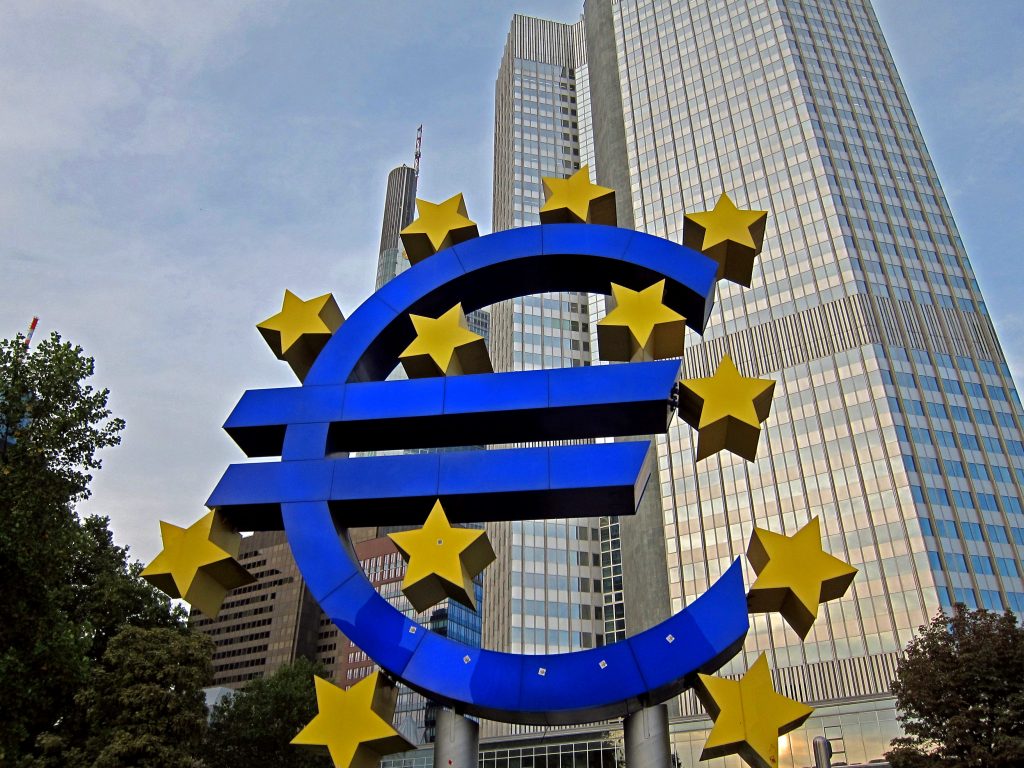
It was fashionable for a time to blame the European Union and in particular the Central Bank for all sorts of economic problems. It still is for those who like to conjure up simple solutions to problems, easily solved by the slaying of a bête noir.
The Latin countries’ bête noir of choice is the Germans. A distinct Latin criticism is that Germans are running the show to their advantage. Further north unnamed bankers fit the criticism bill. Everywhere the bureaucrats are to blame and for some conspiratorial souls the villains form a cabal centered in Bitburg of all places! Overly restrictive monetary policy in the EMU ‘austerity’, they exclaim, is or was keeping the Euro strong and real interest rates high.
This critique ignores the historically low, sometimes negative actual rates. Euro economies, they affirm as a result, are mired in slow growth and deflation protecting only the already well to do, creditors not debtors. “Austerity” is the cause of all of Europe’s problems. Simply said, a looser monetary policy, inflating Europe’s way out of economic stagnation, is the panacea, a cure-all that the Germans, fearful of Weimar type hyper-inflation, stubbornly refuse to consider.
There may be some truth to all this, “wisdom out of the mouths of babes,” but wisdom such as this does not stand up in the adult world. Even at the highest point of rhetorical criticism, financial markets remained unconcerned, putting about a zero probability on anyone leaving the EMU.
Since Brexit began, even leaving the Community and Customs Union appears to be fraught with hurdles, though the British may succeed in some form or other. Leaving the European Monetary Union is another matter altogether. Note we are not talking about bank failure or sovereign default as Greece almost experienced – that indeed would get one out of the EMU, even if the human agency is unlikely to.
Evaluating A Looser Monetary Policy
Let us deal with the arguments raised in favor of a looser monetary policy initially. We shall discuss these before showing that, however, good or erroneous these arguments may be, leaving the EMU would create problems all its own that would inevitably lead to economic collapse.
The first issue is with the erroneous assumption that the monetary policy of the European Central Bank has been consistently tight. Though the ECB’s initial response to the 2007-2008 economic crisis was to lower already low-interest rates only modestly, — they, unfortunately, were already quite low leaving them little room to lower further — the ECB later reversed this policy and accelerated stimulus in 2015 when the economy was seen to be recovering more slowly than hoped.

The ECB then began, in addition to interest rates, to use procedures known as quantitative easing, where the money is injected into the economy through the purchase of debt instruments. Though the economy did respond positively to the change in policy, growth was less than hoped for, still impeded by structural factors and world markets. It is not unreasonable though to think that the ECB acted wisely and that the measures favored by its critics would not have had the desired effects. To determine the appropriateness of ECB policies, we must look at the structure of the EU economy as does the Bank.
The European economy is highly dependent on imported energy with the unique exception of France. For the rest of the Union, large importers of energy, a strong euro purchases more energy per unit of currency than a weaker one. By keeping the Euro strong, the Central Bank kept all important energy import costs at lower levels than they would be with a weaker currency and more expansive monetary policy.
Secondly, the effect of expansionary monetary policy – lower interest rates, more money in circulation and a weaker euro – is according to the ECB’s critics supposed to stimulate the economy, and especially it is hoped the export sector, through a lower exchange rate.
In the real world, unfortunately, things are not so simple. The desired effect depends to a large extent on what one is exporting and how these exports are produced. Exports produced with a high degree of inputs from abroad like petroleum (energy), or other raw materials, may go up in price because the cost increase of these inputs offsets the decline in price resulting from the weaker currency.
After considering one’s production costs, the consideration of a customer’s reaction to the new prices must follow. One of Europe’s principal exports is luxury goods. Dior, Louis Vuitton, Gucci, Mercedes, or Ferrari are sold to select groups of elite shoppers around the world. It is not at all certain how much this market would expand in response to a lower euro and hence better prices abroad. There are only so many very wealthy individuals buying Ferrari’s. A contrary effect where buyers might find the goods devalued from their luxury status through a price drop is even a distinct possibility.
For other products, there may be different constraints on the expansion of sales. Agricultural products are heavy energy users, a negative in a devaluation, but unlike luxury goods may respond well in the market place to lower prices inducing consumers to buy European or in some cases consume more. However, available land, on the other hand, can be a considerable constraint to increasing agricultural production, so even when demand responds favorably, producers may not be able to respond by increasing their production more than marginally.
When looking at the effects of a devalued currency, the ECB must take all these factors into account. It is not at all clear, especially because of Europe’s position as a net energy importer, that the effects of devaluing the Euro would be very beneficial. Another factor too often neglected is that with an ageing, static population that includes immigrants, growth is increasingly harder to come by.
Debts in Euro Will Not Go Away With A New Currency
But one thing is abundantly clear and has been so to markets: whether the critics prevail and monetary policy becomes more accommodative or German fear of inflation continues to pose a restraint, no one is leaving the EMU in order to have their way on these issues and assert a more independent monetary policy. The reason is actually simple.
Under the single currency debts throughout the eurozone are denominated in euros. If countries were to exit and set up new currencies: franc, lira, or peseta, for example, contractual debt would still exist as a holdover in euros and debtors would need to raise money in their new local currency and purchase euros in order to pay back the debt.
All this new buying of euros would cause the value of the Euro to rise against the local currency making it more and more costly to service one’s debt. In what would already be a weak economic environment, many firms would go bankrupt. National governments unable to pay back their debts would also have to declare bankruptcy. Banks would refuse to extend credit for trade. Economic chaos would surely ensue.
A Similar Problem in Poland and Hungary
Something similar happened in Poland and Hungary though on a much smaller scale. While not in the eurozone the two countries thought they could profit from international financial markets to make loans available to homeowners. To diminish their risks, international banks made the housing loans available only for a commitment to repay in euros or Swiss francs.
As few Polish or Hungarian borrowers had income in euros or francs, the weakness of the zloty and forint against these currencies caused repayment costs to go up significantly with numerous foreclosures ensuing. Though losing one’s house is bad enough, this pales to what would happen when leaving the EMU.
All homeowners who live in euro countries have their loans denominated in euros as well as all businesses, governments and other borrowers. A very few large businesses have some loans in dollars, but these will suffer in the same manner as Euro-denominated loans if these businesses have to earn their revenue in deflating currencies.
Italy Contemplates Euro Alternatives
Recently, the Italian Lega-led coalition government offered a resolution in the Italian Parliament to create special bonds. These bonds for repayment of Italian government debt would not be denominated in euros. A new unit called ‘mini BOTS’, where BOTS are ‘buoni ordinari del tesoro’ or ordinary treasury bills, would be created. The BOTS would have a numerical value exchangeable for certain government services like railroad tickets or postal services.

As it stands now, the proposed mini BOTS would have no due date or carry interest like ordinary bonds. They would represent money issued in counterpart to government IOU’s to vendors but would have no fixed value in gold, euros or dollars and limited value in exchange for government services.
The resolution passed but is non-binding lacking implementing legislation, as is often the case with resolutions of this type in Italy. The financial markets did not hiccup as they often do when Italy threatens large budget deficits or other measures that could weaken her banks.
Why is this? Simply because nobody believes that the mini BOTS will be implemented and if they were, they would have no effect at all on possible Euro exit until perhaps twenty years from now. The reason for this is clear. The BOTS would have to establish some value for anyone to accept them in any large quantity to replace existing debt. They would need to be convertible to other more reliable currencies too.
A market for BOTS would then develop trading against the Euro, dollar and other currencies. As the value of the BOTS declined, as it most certainly would be bot: (1) an entirely new currency that few would immediately trust; and (2) backed only by Italian governments running large deficits and whose rhetoric at least has not been thought by many in the international community to be too responsible.
The same problem of paying back debts in a devaluing currency would occur, this time through the loss would be to the creditor or debt holder who would find their investment devalued. No old debt holder with euro debts would want to take them in exchange.
New debt holders might have no choice, but they would raise prices, refuse to sell to the government and push interest rates sky high – through lower prices for the instruments on the aftermarket, as the mini BOTS would initially carry no interest — in order to compensate for the increased risks. BOTS taking on these characteristics of money would additionally violate EMU restrictions Italy agreed to, not to issue alternative currencies.
It would take ten to twenty years for new BOT debt to replace the old euro debt presuming there was any interest among long term debt holders which is very unlikely – at this point discussion is only for short term BOTS so longer debt presumably would still be issued in euros.
In that time, twenty years of economic decline will have been enough to wipe out many Italian governments and leave the euro standing. And remember all new private debt during this period would still be in euros, so the mass of euro debt would still be enormous and prevent the government from leaving.
There is one proposal to make the BOT’s denomination extremely small so that it would target small savers. Such short term, small denomination BOTS might avoid a parallel currency market altogether, as they would be too small to interest most traders.
But, whatever else this short term instrument would do it would not replace the Euro. The cost of administering such a program might also obviate any gain. Right-wing politicians and even a few who should know better may rant about EU hegemony, austerity and other ills. No one though, is leaving the Euro any time soon.
Guest article by Stephen Sposato. This content does not necessarily reflect the official opinion of My Country? Europe. Responsibility for the information and views expressed therein lies entirely with the author.
About the Author: Stephen Sposato is an American who received his Masters in Economic Development from the Rijksuniversiteit Gent and a second Masters in Theoretical Economics from the Universite de Louvain. He has lived an important part of his 72 years in Europe where he has also worked on East European reconstruction. He speaks a number of European languages fluently (English, French, Dutch and some German).






So, to summarise, all of southern Europe will remain trapped in an increasingly impoverished form of economic subjugation, wholly at the mercy of Germany, because the structure of the Eurozone prohibits any escape. There is just one thing. They could always leave and default on their debt. This brings risks, but it would at least offer them some hope of future prosperity. Don’t bet they wouldn’t do it.